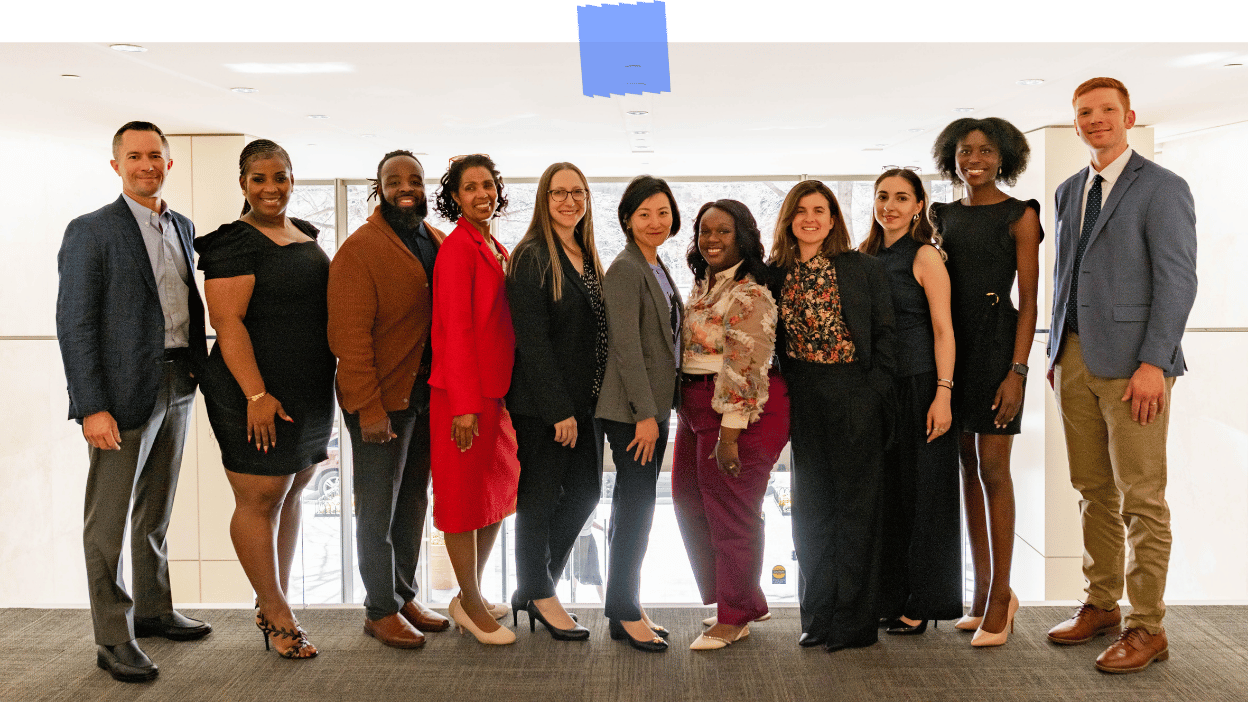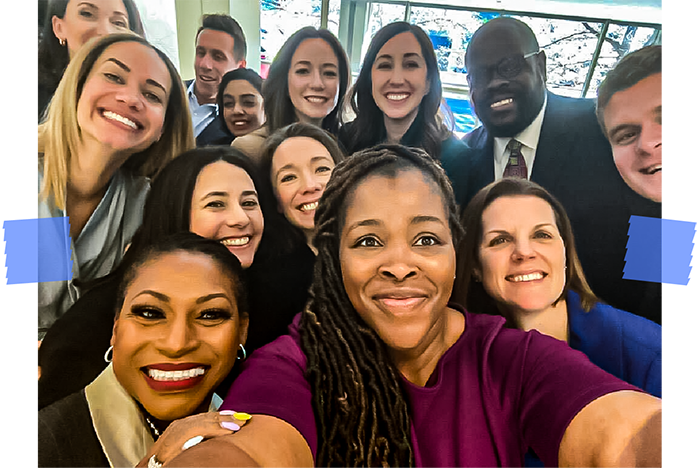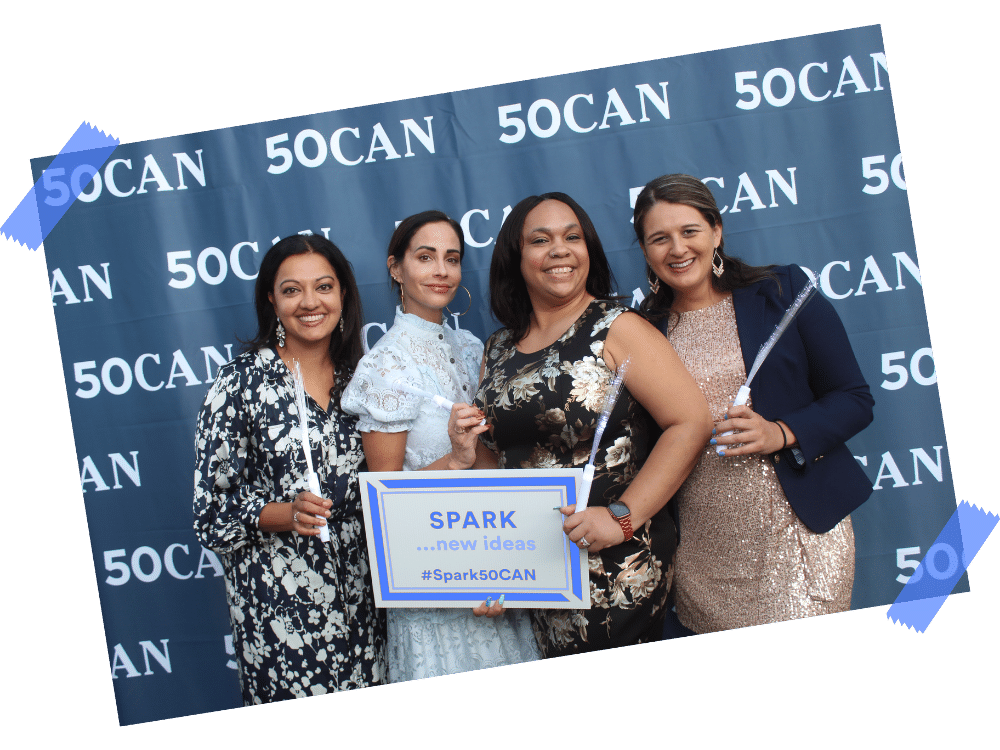In 2019, 50CAN brought together the inaugural cohort of the National Voices Fellowship, a program designed to strengthen the leadership, public profiles, and national networks of the next generation of commentators, correspondents and analysts across the education sector.
The fellowship is grounded by a collaborative, bipartisan pragmatism and offers mentorship and training by some of the education sector’s most prolific thought leaders and communicators.

About the Fellowship
50CAN’s National Voices Fellowship strengthens the leadership and public profiles of the next generation of commentators, correspondents and analysts across the education sector. Grounded in the collaborative pragmatism that created the contemporary education reform movement, the program offers mentorship and training by some of the sector’s most prolific thought leaders and gives fellows the opportunity to collaborate, connect and debate with a diverse and passionate group of rising stars.
Each cohort consists of eight to 12 incredible people (“fellows”) who dedicate a year to:
- Building or enhancing a communications, community or policy platform;
- Developing an audience;
- And honing their voice to accelerate the national conversation about our country’s schools.

Fellows will also participate in a variety of media opportunities, from television and podcasts to authoring op-eds; as such, those selected for the fellowship should be comfortable being visible and vocal in the public arena, debating the future of America’s schools.
By becoming part of a learning community of current and former fellows, participants gain knowledge and skills across four domains:
- Groundbreaking communications
- The past and future of education policy
- Navigating & understanding contemporary political trends
- Knowledge of the strategies used by education advocates & advocacy groups

Given the diversity of students in American schools, the National Voices fellows come from a diverse set of backgrounds and experiences, reflecting urban, rural and suburban communities, as well as from both historically privileged and marginalized communities. Fellows are committed to the belief that the only path forward toward improving our education system is one that relies on the ideas and participation of both political parties working together strategically in a coalition that prioritizes student and family needs and education policy change above political differences.
With access to a suite of resources, connections to mentors across the education reform community, advanced communications training and policy support and an ongoing alumni program, fellows will be well-positioned to steadily grow their voice and audience as they steer a national conversation that places students, their families and educational excellence at the center.
the Fellowship Experience
The National Voices Fellowship will consist of virtual engagements and one to two in-person gatherings. Fellows participate in these meetings to learn the latest policy trends and issues in education while defining their brand and increasing media reach. Each fellow is also invited to connect with the 50CAN leadership team and members of prior cohorts for coaching and development tailored to their unique strengths.
Throughout the fellowship, Fellows will:
Connect and Learn
- Complete a variety of readings to build uniform, foundational knowledge on the history, current state and future of American education
- Attend virtual and in-person meetings featuring some of the education sector’s most prolific and well-known communicators, policymakers, journalists and influencers
- Collaborate with other fellows to discuss political headwinds, surface areas for assistance and synergy and hold each other accountable on personal projects and growth
Build A Platform
- Use 50CAN’s robust suite of tools—alongside mentorship from sector leaders—to build online and offline audiences
- Deepen skills through specialized training in one particular media lane (social, visual, print, etc.) based on personal strengths, interests and an analysis of the area of highest potential impact (E.g. advanced media training for fellows who are well positioned for television)
- Leverage 50CAN and partner networks to cultivate fellow relationships with journalists, editors and producers, increasing access to online, print and on-air appearances
- Execute deliberate communications campaigns to grow their influence as an education expert within their city/region and at the national level
Change the Conversation
- Craft or achieve at least five influential communication outputs that shift the education conversation, including on-air media appearances, op-eds and columns, in-person speaking events and quotes in mainstream media articles
- Weigh in daily on social media regarding education news, policy changes and political events
- Be increasingly seen as an essential voice in the conversation about America’s schools, measured by a predetermined increase in followers and reach
- Cultivate a new disposition around education policy change that respects the current politics as well as the bipartisan spirit and pragmatic deal-making that created the current education reform movement
Fellows will develop their skills and knowledge across four domains. Here is an early sample of topics that will be covered through sessions and mentorship:
Groundbreaking Communications
- Baseline skill development on effective communications
- Understanding what makes a strong and interesting narrative that will appeal to reporters, producers and community groups
- Gaining the necessary proficiencies for on-camera work
- Honing and improving influential writing; including the crafting of strong op-eds
- Building an online brand
- Social media tactics
- Discovering how journalists and editors craft and select stories
- Disrupting the opposition’s “noise machine” — the process by which unfavorable articles or research cross the barrier from opposing activist blogs and social media into mainstream news
Navigating Contemporary Political Trends
- Influencing the political conversation across traditional divides
- Education in the era of Covid-19 and a changing political landscape
- Electoral and issue trends at the state and national levels
Education Policy – Past and Future
- An understanding of the fundamentals of American education policy
- From No Child Left Behind to Every Student Succeeds: past and future lessons
- Assessments, accountability and performance
- Pluralism, choice and competition
- Community and diversity
- Emerging trends
- Understanding the emerging policy levers and vocabulary necessary to create the foundations of the next iteration of reform
- Understanding Covid-19’s effect on schools, including polling of parent views and emerging policy frameworks
Education Advocacy
- The 50CAN Advocacy Framework
- Baseline skills needed for local education advocacy
- Case studies of successful and failed advocacy campaigns across a variety of states
- Launching influence campaigns on behalf of allies
- Supporting local advocates with communications to bring their issues to the forefront

